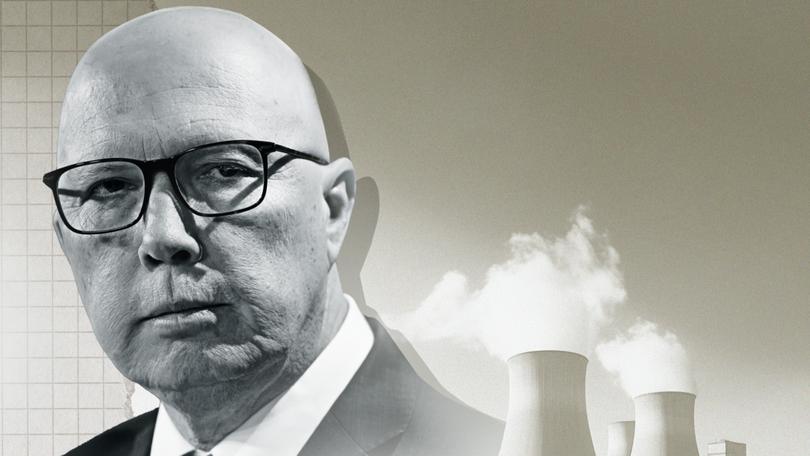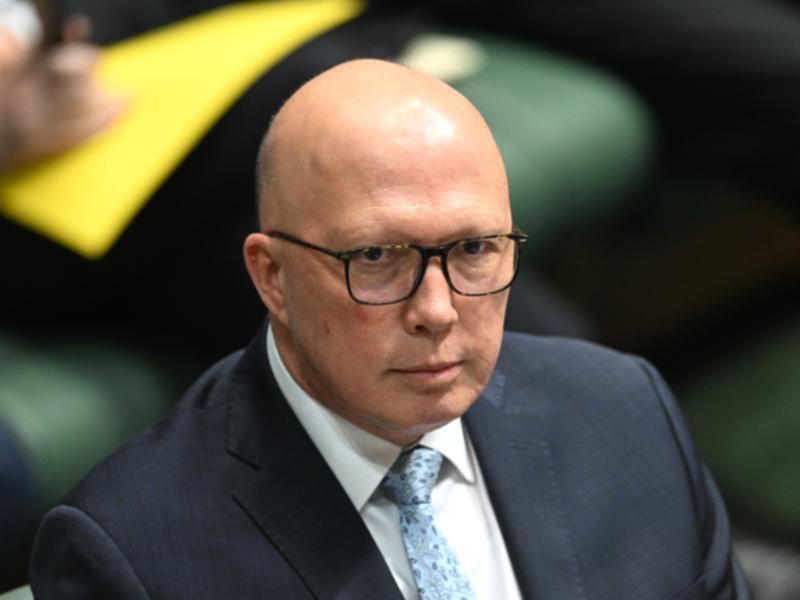Peter Dutton says rising energy costs and renewables shortfall adds to case for nuclear
Peter Dutton says his nuclear energy plan is in the ‘best interests of the country’ as he jumped on a new report that revealed a lack of reliability from renewable sources had fuelled a surge in power prices.

Peter Dutton says his nuclear energy plan is in the “best interests of the country” as he jumped on a new report that revealed a lack of reliability from renewable sources during peak demand had fuelled a surge in electricity prices.
The Opposition Leader doubled down on his pitch to voters on Wednesday, as Australia’s Energy Market Operator revealed there had been a “record demand” for electricity across late autumn and early winter — prompting energy prices to surge at a time weather conditions led to reduced power output from wind and hydro.
Gas-fired generation increased to meet the shortfalls, but Mr Dutton said the findings reinforced the need for “reliable baseload power”, namely nuclear.
Sign up to The Nightly's newsletters.
Get the first look at the digital newspaper, curated daily stories and breaking headlines delivered to your inbox.
By continuing you agree to our Terms and Privacy Policy.“What this report shows is that the lights are going to go out... you can’t run a full-time economy on part-time power,” he said.
“We know that when we’ve got no wind blowing, when you’ve got a period of rain or cloudy weather, the intermittent power is not feeding into the network and you need to have a reliable baseload power.
“We do want renewable energy in the mix . . . and we do want 24/7 baseload power for when those energy sources aren’t working, and that’s nuclear.”
Mr Dutton last month announced a Coalition government would build seven nuclear plants — including two small modular reactors — at ageing coal-fired power stations across the country.
Under the plan, the first would be online between 2035-37, with all seven operational by 2050.
The Nightly understands further details about the Coalition’s nuclear policy — potentially including costings — will be revealed before parliament returns from its winter break on August 12.
A new report out on Wednesday from the Australian Academy of Technological Sciences and Engineering found small modular reactors could form part of Australia’s “future low-carbon energy mix” and contribute to baseload power but warned a mature market would be unlikely to emerge until the mid-late 2040s.
The report said while there was an “urgent need” for mature, low-carbon technologies to fill the gap left by retiring coal-fired power stations, it warned that if Australia chose to enter the SMR market before the market reached maturity, it could carry “a significant financial cost and technical risk”.
“The least risky option for Australia would be to procure SMRs once several models have been established and are proven and operational in other OECD countries,” the report said.
Finance Minister Katy Gallagher used it to launch a fresh attack on the Coalition’s plan, saying the idea of small nuclear reactors was “pretty fanciful”.
“I think the nuclear debate really is a distraction from what actually needs to happen, which is we need to make that transition, we need firming energy at the same time — which is why gas is... important — but the future of the energy system is renewable,” she said.
Mr Dutton said the Coalition had done the analysis, spoken to experts, and was confident there could be nuclear in the system by 2035 at the earliest.

Mr Dutton went on to accuse Labor of being hypocritical in its nuclear attack, raising questions over the Government’s plan to phase in green hydrogen as the energy market’s baseload power - a plan that has been cast into doubt after Andrew Forrest last week revealed he was pushing back his ambitious green hydrogen target.
“Just to be clear, when people talk about the phasing period for nuclear power, you’ve then got to ask the government, ‘well, what’s the phasing in period for your baseload power?” Mr Dutton posited on Wednesday.
“Our argument is that if you’ve got 90 per cent of baseload power, predominantly coal going out of the system over the next decade, what replaces it? You need renewables, you need a lot of gas, and you need nuclear in the mix.”
Mr Dutton said he would have “more to say” on the role gas would play should the Coalition win the next election, but said the latest AEMO report underscored the importance of it in the mix.
The operator’s latest dynamics report out on Wednesday found cold weather had driven a “new record” for demand for the National Electricity Market in the June quarter.
During those three months, low wind speeds and reduced rainfall led to a 20 per cent decrease in wind-generated power, and an 18 per cent decrease in hydro-generated electricity.
Gas production was up 16 per cent and black coal supply increased seven per cent to meet the shortfall.
AEMO chief executive Daniel Westerman said the market conditions “highlight the important role that batteries, pumped hydro, and flexible gas generation will play” as the country continues to transition to renewables.
The Albanese Government said the report underscored why Labor was committed to keeping gas in the mix as more and more renewables projects are brought online.
“There is a role for gas. We’re not pretending that you can do everything on renewables in the short term, that there is an important role as a firming source of energy for gas to continue,” Senator Gallagher said.
“Which is why you’re seeing approvals for further exploration of gas reserves. We’ve been very clear about that.”
Assistant Minister for Climate Change and Energy Jenny McAllister said the report crucially showed renewables “remain the lowest cost form of generation, and are making an increasingly important contribution to the grid”.
With Dan Jervis-Bardy

